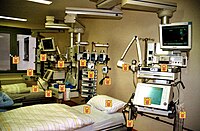
Photo from wikipedia
BACKGROUND Nosocomial infections are a leading cause of morbidity, costs and mortality in preterm newborns. Most reports regarding nosocomial infections in neonatal intensive care units (NICU) are focused on bacterial… Click to show full abstract
BACKGROUND Nosocomial infections are a leading cause of morbidity, costs and mortality in preterm newborns. Most reports regarding nosocomial infections in neonatal intensive care units (NICU) are focused on bacterial infections and there is limited information regarding the impact of nosocomial viruses. The objective of this study was to assess the impact of nosocomial respiratory syncytial virus (RSV) infections in a NICU. METHODS This was a retrospective cohort design from a NICU in a general hospital in Mexico. We included 24 newborn infants with nosocomial RSV infection and 24 infants without RSV matched by gestational age, birth weight, and the period of time of hospitalization. RESULTS Infants with nosocomial RSV infection had longer hospitalization duration (median 24 days vs. 13 days; P=0.05), increased antibiotic use (45.8% vs. 8.3%; P=0.003), more mechanical ventilation requirement (54.2% vs. 0.4%; P<0.001), more frequent nosocomial infections (45.8% vs. 0%; P<0.001), and higher hospitalization direct costs (median 3,587.20 USD vs. 1,123.60 USD; P=0.001) after nosocomial RSV detection. CONCLUSION Nosocomial RSV infections are associated to a significant increase of costs in infants hospitalized in the NICU. Evaluation of interventions that may reduce the incidence of nosocomial RSV infections in this setting is warranted.
Journal Title: American journal of infection control
Year Published: 2020
Link to full text (if available)
Share on Social Media: Sign Up to like & get
recommendations!